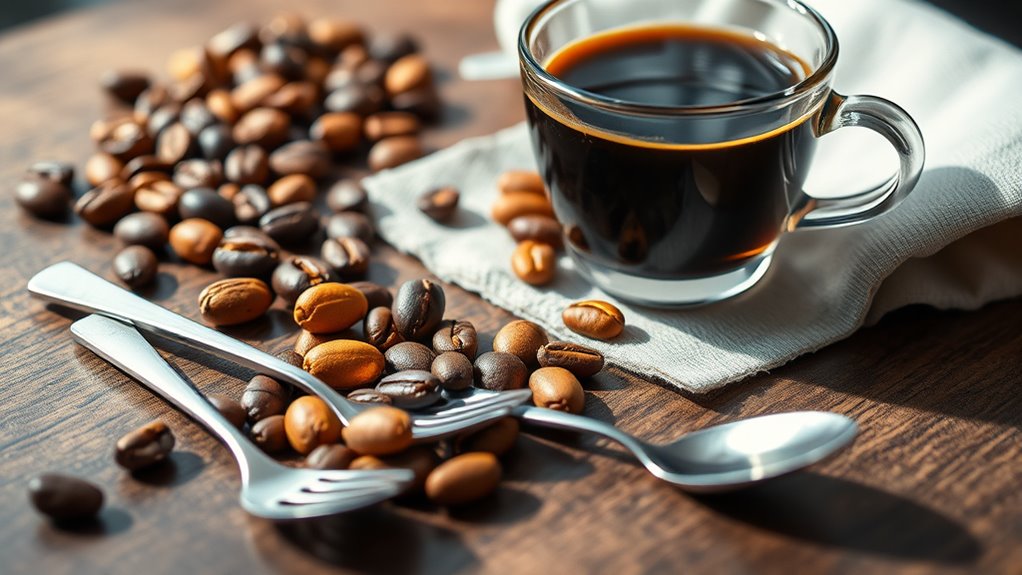The most expensive coffees stand out because of their rare, labor-intensive production involving animal digestion—like elephants or civets—which adds unique, fruity, and chocolatey flavors. Limited supply and exotic locations also boost their exclusivity and price. These coffees are often served in luxury settings, emphasizing their rarity and complex taste. If you keep exploring, you’ll uncover the fascinating details behind these extraordinary brews and what truly makes them special.
Key Takeaways
- Unique, animal-driven fermentation processes like Black Ivory and Kopi Luwak create distinctive, complex flavor profiles that set these coffees apart.
- Limited production and high labor costs make these coffees rare, increasing their market value and exclusivity.
- Exotic cultivation locations such as Thailand and Indonesia contribute to their distinctive taste and luxurious appeal.
- Their smooth, fruity, and chocolatey flavors, enhanced by fermentation, appeal to connoisseurs seeking exceptional quality.
- Strong branding, cultural significance, and association with luxury venues elevate their status and justify their high prices.

When it comes to luxury coffee, a few varieties stand out for their extraordinary prices and exclusivity. These coffees aren’t just about caffeine; they’re about the story, the process, and the rarity that elevate them beyond ordinary brews. Black Ivory and Kopi Luwak exemplify this, involving unique animal-driven processes that transform how the beans are produced.
Black Ivory, for instance, involves elephants ingesting coffee beans, which alters their flavor profile. The beans pass through the elephants’ digestive systems, resulting in a smoother, less bitter taste with hints of chocolate and fruit. Kopi Luwak takes a different route, processed through the digestive system of the Asian palm civet, which ferments the beans naturally. Both methods are highly labor-intensive and require specialized knowledge, leading to extremely limited yields.
Because only a small amount of these coffees can be produced annually, their scarcity drives up prices, often reaching around $3,000 per kilogram for Black Ivory, with Kopi Luwak prices varying widely depending on quality and origin.
These coffees are cultivated in exotic locations such as Thailand, Indonesia, and the Maldives, adding to their allure. The regions’ lush landscapes and unique climates contribute to the distinct flavors that make these coffees highly sought after worldwide. Their flavor profiles are celebrated for smoothness and complexity, often described as fruity, chocolatey, or both.
These characteristics are a result of the fermentation process during digestion, which enhances the beans’ natural qualities. High grading systems and expert tasting panels confirm their exceptional quality, solidifying their status as luxury items.
Exclusivity plays a significant role in their appeal. These coffees are often served in high-end resorts and exclusive restaurants, targeting a select clientele willing to pay premium prices. Heavy marketing emphasizes their exotic origins and rare processing methods, further fueling demand among connoisseurs and status-conscious consumers.
Despite their hefty price tags, these coffees enjoy a global following, with many willing to invest in the experience of tasting something truly rare.
Beyond their luxury appeal, these coffees impact local economies positively by providing employment and supporting community development in their regions of origin. Tourism related to coffee plantations attracts visitors eager to learn about their production, contributing to local growth.
However, environmental considerations are vital to guarantee sustainable practices; overharvesting or unethical animal treatment can threaten their status as luxury products. Overall, the most expensive coffees in the world are prized not just for their flavor but for what they represent: rarity, craftsmanship, and a connection to nature’s extraordinary processes.
Frequently Asked Questions
How Is the Price of These Coffees Determined?
You might wonder how the price of coffee is determined. It depends on factors like the variety and quality of beans, their origin, and the processing methods used.
High-altitude or unique terroir regions, along with limited supply and specialty processing, drive prices up. Market demand, logistical costs, and certifications also play a role, making some coffees more expensive due to their rarity, quality, and the effort involved in production.
Are These Coffees Ethically Sourced and Sustainable?
You might wonder if these pricey coffees are ethically sourced and sustainable. Many producers focus on ethical practices, like Black Ivory’s elephant welfare and sustainable farming methods. However, some, like Kopi Luwak, face controversy over animal treatment.
Your choices can support ethical and eco-friendly options by selecting certified coffees or brands committed to sustainability. By doing so, you enjoy luxury coffee while promoting responsible production practices.
Can Anyone Buy These Expensive Coffees?
Ever wonder if you can get your hands on these rare coffees? The answer is yes, but it’s not always simple. You might need to buy through specialty retailers, participate in auctions, or make reservations well in advance.
Some coffees are only available at exclusive locations or through specific channels, and prices can be sky-high. So, while anyone can try, accessing these luxurious brews often requires effort and a keen eye.
How Do the Flavors of These Coffees Differ From Regular Ones?
You’ll notice that these rare coffees have unique flavors compared to regular ones. For example, Black Ivory offers smooth, chocolatey notes, while Kopi Luwak has earthy, smoky flavors.
Geisha coffee features floral and citrus hints, and Jamaican Blue Mountain delivers a mild, sweet taste.
These coffees often have richer, more complex profiles, making each sip a distinctive experience. Their special production methods and limited supplies elevate their flavors beyond typical daily brews.
What Is the Best Way to Brew These Luxurious Coffees?
When brewing luxurious coffees, you want to choose a method that highlights their unique qualities. Use a pour-over or Chemex for clarity and balance, or an espresso for richness.
Always start with freshly ground beans and high-quality water, maintaining precise temperature and extraction time.
Invest in good equipment, like a precision grinder and thermometer, to make certain every cup captures the full depth and complexity of your premium beans.
Conclusion
Now that you know what makes these coffees so costly, it’s clear their rarity and unique production methods drive their value. Did you know that Kopi Luwak costs up to $600 per pound? That’s more than many luxury items! So, next time you sip your coffee, consider the journey behind each cup and the exclusivity that makes certain brews truly extraordinary. Coffee isn’t just a morning pick-me-up — it’s a luxury experience.









